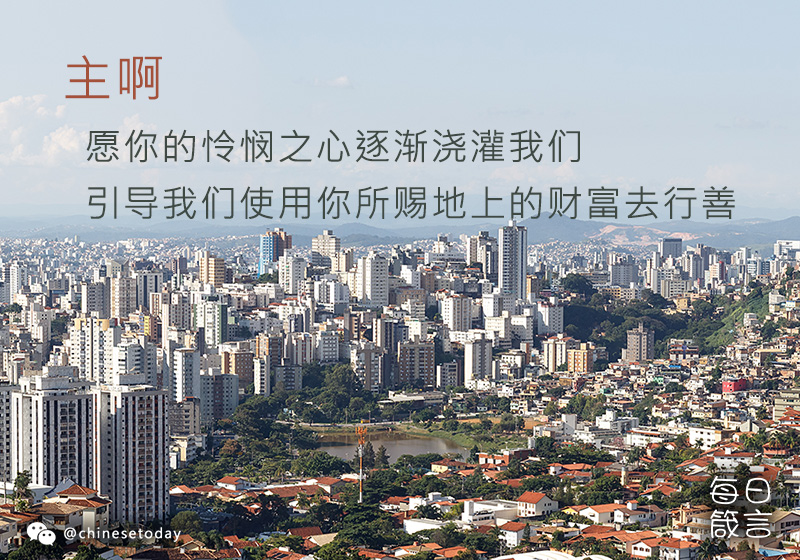

耶稣就像那些把神的话传达给百姓的先知们一样,对穷人存着怜悯之心,常常责备那些自私的富人对穷人不管不顾。在耶稣的比喻中,穷人拉撒路死后,被天使带到天上亚伯拉罕的怀里,而富人却下了地狱,在那里受苦。
那个富人在世的时候只顾自己享受,无视摩西和先知们的话。拉撒路活着的时候没有得到安慰,可是死后却得到了与天上的神同在的永生的福分。
这个比喻对于19世纪美国南部的奴隶们来说,是个极大的安慰。他们的一首灵歌唱道“在亚伯拉罕的怀中”,神是“我灵魂的磐石”。就是出自这里的经文。当那些奴隶的孩子们从父母的怀里被抢走,在河边被卖掉;当地上的权势合起来抵挡他们时,他们能在哪里找到公义呢?但主看见了他们的苦情。祂会将公义带给受压迫的人。
在耶稣的比喻中,富人的罪并不是因为他富有;而是他拒绝关顾穷乏人。他的石心无视与饥饿之人分享食物的命令,无视给穷乏人提供住处和衣服的命令(赛 58:7)。
主啊,愿你的怜悯之心逐渐浇灌我们,引导我们使用你所赐地上的财富去行善。奉怜悯我们的耶稣之名,阿们。

路加福音 16:19-31
19“有一个财主,穿着紫色袍和细麻布衣服,天天奢华宴乐。
20又有一个讨饭的名叫拉撒路,浑身生疮,被人放在财主门口,
21要得财主桌子上掉下来的零碎充饥,并且狗来舔他的疮。
22后来那讨饭的死了,被天使带去放在亚伯拉罕的怀里。财主也死了,并且埋葬了。
23他在阴间受痛苦,举目远远地望见亚伯拉罕,又望见拉撒路在他怀里,
24就喊着说:‘我祖亚伯拉罕哪,可怜我吧!打发拉撒路来,用指头尖蘸点水,凉凉我的舌头,因为我在这火焰里极其痛苦。’
25亚伯拉罕说:‘儿啊,你该回想你生前享过福,拉撒路也受过苦;如今他在这里得安慰,你倒受痛苦。
26不但这样,并且在你我之间有深渊限定,以致人要从这边过到你们那边是不能的,要从那边过到我们这边也是不能的。’
27财主说:‘我祖啊,既是这样,求你打发拉撒路到我父家去,
28因为我还有五个弟兄,他可以对他们作见证,免得他们也来到这痛苦的地方。’
29亚伯拉罕说:‘他们有摩西和先知的话可以听从。’
30他说:‘我祖亚伯拉罕哪,不是的,若有一个从死里复活的,到他们那里去的,他们必要悔改。’
31亚伯拉罕说:‘若不听从摩西和先知的话,就是有一个从死里复活的,他们也是不听劝。’”
“There was a rich man who . . . lived in luxury every day. At his gate was . . . Lazarus, covered with sores and longing to eat what fell from the rich man’s table.” — Luke 16:19-21
Like the prophets who brought God’s Word to the people, Jesus had sympathy for the poor and often rebuked rich people who were selfish and did nothing for the poor. In Jesus’ parable, the poor man Lazarus who died was carried by angels to Abraham’s side in heaven, and the rich man was sent to hell, where he was in torment.
The rich man had lived for his own pleasure and had ignored the message of Moses and the Prophets. Lazarus had had no comfort in life, but in death he received the blessings of life with God in heaven.
This parable was a comfort to many slaves in the American South in the 1800s. One of their spiritual songs speaks of God as the “Rock of my soul” in “the bosom of Abraham”—an expression referring to “Abraham’s side.” Where could those slaves find justice when their children were ripped from their arms and sold down the river, when the earthly powers-that-be were stacked against them? But the Lord saw their plight. And he will bring justice to the oppressor.
In Jesus’ parable, the rich man’s sin was not that he was rich; it was that he refused to care for a person in need. His stony heart ignored the call to share food with the hungry and to provide shelter and clothing for people in need (Isaiah 58:7).
Lord, instill in us your heart of compassion, and lead us to do some good with the earthly treasures you have given us. In the name of the One who has compassion on us, Amen.
诵读: 骆云秀
片头: 张妙阳

